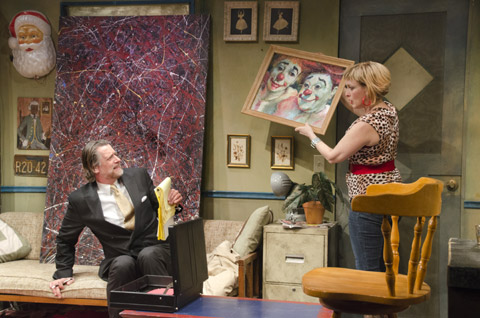
BUT IS IT ART? A play about the viability of abstract art is also about life's choices and individual free will.
|
Fortunately, Elvis Costello's dictum that writing about music is like dancing about architecture doesn't apply to playwrights taking on the world of art, which has been the subtext for three provocative Boston-area plays recently. Modern art, specifically — an all-white painting in Art, the work of Mark Rothko in Red, and now a canvas by Jackson Pollock (or is it?) in Bakersfield Mist at the Arsenal Center for the Arts Black Box Theater (through March 25).Each of the playwrights draws on a certain public disdain for abstract art — why should we take seriously painting that doesn't seem to be about anything? If you need a college education to understand a work of art, what does that say about the art world's divorce from public dialogue?
And, then, of course, the plays give us a chance to laugh at all that elitist snobbery— even at Rothko for his disdain of Andy Warhol and his "knowing" that Warhol wouldn't stand the test of time. In Stephen Sachs's Bakersfield Mist, that snobbery is front and center in the person of art connoisseur Lionel Percy, drawn to the trailer-park home of Maude Gutman, who says she bought a painting at a thrift shop as a joke because it was the worst thing she could find there, but now has proof that it's an original Pollock.
Sound contrived? Not at all. The play stays close to the true story of Teri Horton, who was the subject of a documentary called Who the Fuck Is Jackson Pollock? That was her response when told she might have bought a Pollock for five bucks.
Sachs has all kinds of fun with both the snob and trailer trash stereotypes, but the play's strength lies in its ability to go beyond them, to give both cultural warriors a dignity in the worlds they inhabit. If the dialogue about art isn't as smart as in the Rothko play, Percy's aria about the majesty of Pollock is terrific. Gutman, meanwhile, claims that her kitschy painting of two clowns is superior to the supposed Pollock. She starts to come around, though, and her own aria, about her son's inner life being as explosive as Percy's description of a Pollock painting, is the play's emotional highlight. It's part of Sachs's questioning of whether people choose how to live their lives or are channeled into those lives by forces outside their control.
Everything about the New Repertory Theatre coproduction with the Wellfleet Harbor Actors Theater is first-rate. As Lionel and Maude, Ken Cheeseman and Paula Langton work so well together that they could be a latter-day George Burns and Gracie Allen — they're married in real life. Jeff Zinn's direction, with many of his former WHAT colleagues designing the show, is pitch-perfect. (Jiyoun Chang's decoration of the trailer interior is worth the admission.)